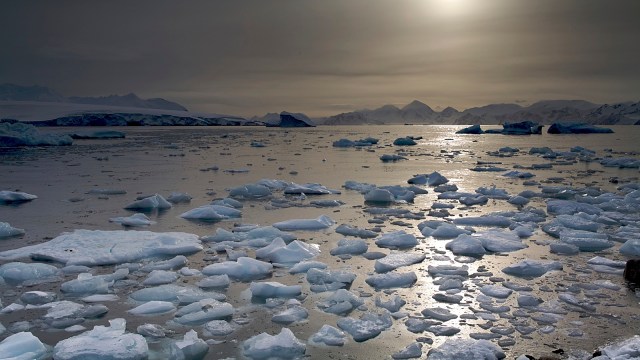‘What happens in Antarctica doesn’t stay in Antarctica’: As ice melts, a warning from India’s polar research agency head
At an event to commemorate the 25th Foundation Day of NCPOR on Thursday, Meloth said Antarctica and the Arctic are important in controlling the global weather patterns.
 Although melting of ice happens in the polar regions, the actual rise in sea level is much higher in tropical regions like ours, due to various compounding factors.(Photo: AP)
Although melting of ice happens in the polar regions, the actual rise in sea level is much higher in tropical regions like ours, due to various compounding factors.(Photo: AP)When the Arctic Ocean becomes ice-free in summer in the coming decades, the region will become a “hotbed” of international geopolitics, said Dr Thamban Meloth, director of the Goa-based National Centre for Polar and Ocean Research (NCPOR) Goa, the nodal agency for India’s polar expeditions.
At an event to commemorate the 25th Foundation Day of NCPOR on Thursday, Meloth said Antarctica and the Arctic are important in controlling the global weather patterns.
“Recent studies have shown that melting of Arctic sea-ice can impact the Indian monsoon precipitation and its extremes. Antarctica houses nearly 70% global freshwater in frozen form… If it melts, it can lead to an increase in sea level by about 60 metres, potentially sinking all the coastal cities. Although melting of ice happens in the polar regions, the actual rise in sea level is much higher in tropical regions like ours, due to various compounding factors. So, what happens in Antarctica or the Arctic does not stay there. It seriously affects us,” he said.
Meloth said that as “the Arctic sea-ice will disappear during the summer in the coming decades, the region will become a hotbed of international geopolitics due to the availability of mineral and fishery resources hidden below the frozen sea as well as by potentially opening a northern sea route”.
“Already you hear the US President talk about (taking control of) Greenland. This is why the polar regions have become so important. Those who have access to the polar regions have strategic power. And as the area becomes ice-free, there will be more minerals available, more fisheries available, so one should be prepared to know how to access that, so that you can be part of the international…chain of countries who want to access that,” he said.
At the event, officials reminisced about India’s first scientific expedition to Antarctica and the circumstances around setting up India’s first research station – Dakshin Gangotri – in Antarctica in 1983.
On December 6, 1981 a 21-member crew of scientists, technicians and Navy personnel aboard a chartered Norwegian ship MV Polar Circle set sail from Goa’s Mormugao harbour. Part of India’s first scientific expedition to the ‘White Continent’, the crew set foot on the coast of Queen Maud Land a little over a month later, on January 9, 1982, and hoisted the Indian flag.
Must Read


Buzzing Now


Apr 13: Latest News
- 01
- 02
- 03
- 04
- 05





















